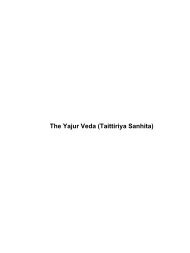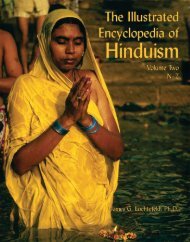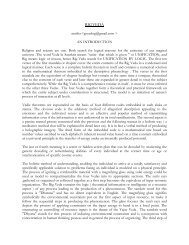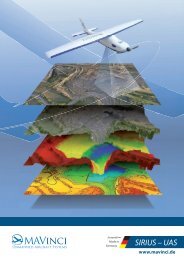- Page 1 and 2:
The Illustrated Encyclopedia of Hin
- Page 3 and 4:
Published in 2001 by The Rosen Publ
- Page 5 and 6:
Nadi reality of the Self (atman), i
- Page 7 and 8:
Nageshvar 454 (pradakshina). Despit
- Page 9 and 10:
Naisthika 456 Naisthika (“fixed
- Page 11 and 12:
Namarupa that this rite should be d
- Page 13 and 14:
Nanddas 460 Statue of Nandi, the bu
- Page 15 and 16:
Narasimha Jayanti 462 with the head
- Page 17 and 18:
Nastika tradition, the Kumbha Mela
- Page 19 and 20:
Nath 466 competition with a dance c
- Page 21 and 22:
Navadvip Worshipers celebrating the
- Page 23 and 24:
Nayachandra Suri 470 nothing to beg
- Page 25 and 26:
Nigantha Nataputta excerpts on a pa
- Page 27 and 28:
Nirakara 474 Nirakara (“without f
- Page 29 and 30:
Nirmohi (“free from illusion”)
- Page 31 and 32:
Nivedita, Sister 478 (1197-1276). M
- Page 33 and 34:
Nyasa 480 married woman. The except
- Page 35 and 36:
Obscenity 482 O Obscenity Tradition
- Page 37 and 38:
Organs of Action Temple to the sun
- Page 39 and 40:
Pacification of Planets 486 P Pacif
- Page 41 and 42:
Padya from their functional use as
- Page 43 and 44: Palanquin between the sixth and nin
- Page 45 and 46: Panchamahayajna 492 (4th-3rd c. B.C
- Page 47 and 48: Panchayatana (“five-abode”) Puj
- Page 49 and 50: Pandrenthan 496 in which the pilgri
- Page 51 and 52: Pap 498 panth is more closely assoc
- Page 53 and 54: Parashu 500 The god Vishnu’s Para
- Page 55 and 56: Parivartini Ekadashi 502 already pr
- Page 57 and 58: Parvati Parvati with her husband Sh
- Page 59 and 60: Pashupatinath 506 The Pashupatinath
- Page 61 and 62: Paush 508 Paush According to the lu
- Page 63 and 64: Philosophy 510 symbolic form Shiva
- Page 65 and 66: Pitr During Pitrpaksha, Hindus offe
- Page 67 and 68: Pole Star 514 qualities weakened an
- Page 69 and 70: Prabhupada, A.C. Bhaktivedanta 516
- Page 71 and 72: Pradhana 518 a deity as part of wor
- Page 73 and 74: Prakrit Since Brahman is believed t
- Page 75 and 76: Pranapratishtha 522 samana (in the
- Page 77 and 78: Pratihara Dynasty 524 Pratihara Dyn
- Page 79 and 80: Pravara 526 one of several episodes
- Page 81 and 82: Priyadas 528 Priyadas (early 18th c
- Page 83 and 84: Pujari brahmin priest acts as an in
- Page 85 and 86: Punya 532 Hindi-speaking regions),
- Page 87 and 88: Puri Dashanami 534 into the pantheo
- Page 89 and 90: Pururavas 536 responsible for super
- Page 91 and 92: Pushan The city of Pushkar is built
- Page 93: Pushyabhuti Dynasty 540 ultimate so
- Page 97 and 98: Radhashtami 544 of his generation,
- Page 99 and 100: Raidas 546 in the heavens. He alway
- Page 101 and 102: Rajasuya Basohli paintings of the P
- Page 103 and 104: Rakshasa 550 their brothers from mi
- Page 105 and 106: Ramakrishna 552 claim that she rema
- Page 107 and 108: Ramanand Sagar 554 All of the stori
- Page 109 and 110: Ramayana Ramayana Characters A. The
- Page 111 and 112: Rambha Ekadashi 558 convinced of Si
- Page 113 and 114: Rameshvaram 560 Rama’s attack on
- Page 115 and 116: Ramnagar 562 revolves around the un
- Page 117 and 118: Ramsnehi 564 religious community.)
- Page 119 and 120: Rasik 566 mission is to provide lea
- Page 121 and 122: Rati 568 Relief sculpture of the de
- Page 123 and 124: Rawal 570 February), celebrated as
- Page 125 and 126: Rg Veda 572 government jobs or plac
- Page 127 and 128: Rishi Panchami 574 their sacrifices
- Page 129 and 130: Rta 576 model for others to use. Fo
- Page 131 and 132: Sabarmati 578 S Sabarmati Northern
- Page 133 and 134: Sadhana A man smokes from a chillum
- Page 135 and 136: Saguna different name—in this cas
- Page 137 and 138: Sakha (“companion”) Bhava 584 S
- Page 139 and 140: Samavaya The four Vedas in Sanskrit
- Page 141 and 142: Samkhya 588 sattva tends toward the
- Page 143 and 144: Samskara The chudakarana samskara,
- Page 145 and 146:
Samyama 592 the Ram Lila alternates
- Page 147 and 148:
Sandhya 594 Sandhya (“union”) M
- Page 149 and 150:
Sant 596 An illustrated page of San
- Page 151 and 152:
Santoshi Ma Vrat 598 concrete benef
- Page 153 and 154:
Sapindikarana 600 A groom and bride
- Page 155 and 156:
Saraswati A depiction of Saraswati,
- Page 157 and 158:
Sarvadarshanasangraha 604 Athens in
- Page 159 and 160:
Satkaryavada 606 Daksha why he has
- Page 161 and 162:
Sattan associate with fellow devote
- Page 163 and 164:
Satyavati 610 Satyavati In Hindu my
- Page 165 and 166:
Savitri According to the dharma lit
- Page 167 and 168:
Self-Revealing Knowledge 614 Self-R
- Page 169 and 170:
Seven Sacred Cities 616 ideal of a
- Page 171 and 172:
Shaiva Nagas 618 Pashupatas. All th
- Page 173 and 174:
Shakra 620 Shakra An epithet of the
- Page 175 and 176:
Shalagram 622 Believed to be a mani
- Page 177 and 178:
Shankaracharyas A shankha, or conch
- Page 179 and 180:
Sharva 626 Shiva who are divided in
- Page 181 and 182:
Shesha 628 purification. Body hair,
- Page 183 and 184:
Shilappadigaram 630 Image of the go
- Page 185 and 186:
Shishupala 632 Shishupala In the Ma
- Page 187 and 188:
Shiva 634 Statue of the god Shiva f
- Page 189 and 190:
Shivaji Ascetics observing Shivarat
- Page 191 and 192:
Shiwalik Hills 638 sign of this ide
- Page 193 and 194:
Shravan 640 performing the sacrific
- Page 195 and 196:
Shringeri 642 Shrirangam, an island
- Page 197 and 198:
Shrishaila 644 traces its spiritual
- Page 199 and 200:
Shuddhi 646 specific attributes, th
- Page 201 and 202:
Shula 648 The god Shiva carrying a
- Page 203 and 204:
Shyam 650 yoga, which is the first
- Page 205 and 206:
Sinhastha Mela 652 Depiction of Sit
- Page 207 and 208:
Sitamarhi 654 her eyes modestly dow
- Page 209 and 210:
Smallpox 656 In northern India Skan
- Page 211 and 212:
Snataka 658 Bathing is normally the
- Page 213 and 214:
Somnath Somnath Shore Temple, Gujar
- Page 215 and 216:
Sopashraya 662 birth of a daughter
- Page 217 and 218:
Steya 664 modes of religious life
- Page 219 and 220:
Subtle Body Vishnu, surrounded by w
- Page 221 and 222:
Sudarshana Sampraday 668 of the sun
- Page 223 and 224:
Sundaramurtti 670 The Sun Temple at
- Page 225 and 226:
Surdas 672 joining (yoga) of the sp
- Page 227 and 228:
Surya A painted relief of Surya, th
- Page 229 and 230:
Suta 676 sushumna is closed where i
- Page 231 and 232:
Svaprakasha lilas in the town of Br
- Page 233 and 234:
Svayamvara 680 primary stress at th
- Page 235 and 236:
Tad Ekam 682 T Tad Ekam (“That On
- Page 237 and 238:
Talikota 684 Talikota City in the B
- Page 239 and 240:
Tamoyoga Tamil Nadu is home to the
- Page 241 and 242:
Tantra 688 of the subtle elements b
- Page 243 and 244:
Tarakeshvar 690 will marry the godd
- Page 245 and 246:
Teej Teej Teej is a name denoting t
- Page 247 and 248:
Thakur 694 Shrivaishnavas are devot
- Page 249 and 250:
Thug 696 K’s” that all Sikhs ar
- Page 251 and 252:
Time 698 domination by the Moghul e
- Page 253 and 254:
Tiruchendur 700 A group of pilgrims
- Page 255 and 256:
Tirumalisai 702 and the enormous Mi
- Page 257 and 258:
Tiruvachakam 704 Tiruvachakam (“h
- Page 259 and 260:
Tota Puri 706 The god Vishnu’s To
- Page 261 and 262:
Tridosha 708 and sculpture, in whic
- Page 263 and 264:
Trishanku 710 single arrow through
- Page 265 and 266:
Tuesday 712 Tryambakeshvar in the f
- Page 267 and 268:
Tumari the opening, with the remain
- Page 269 and 270:
Tyag Tyag (“renunciation”) Prac
- Page 271 and 272:
Udgatr standoff, with each side una
- Page 273 and 274:
Uma ulatbamsi, see Appendix A in Li
- Page 275 and 276:
Upanishad 722 this entitlement came
- Page 277 and 278:
Urdhvapundra An ascetic with the ur
- Page 279 and 280:
Utpanna Ekadashi 726 deity that som
- Page 281 and 282:
Vachaspati Mishra 728 V Vachaspati
- Page 283 and 284:
Vaisheshika One of the many forms o
- Page 285 and 286:
Vaishnava 732 Alvars, a group of tw
- Page 287 and 288:
Vaitarani 734 vaishyas did all sort
- Page 289 and 290:
Valmiki Jayanti composed. After thi
- Page 291 and 292:
Vanamalin 738 philosopher, Shankara
- Page 293 and 294:
Varna Child celebrating Vasant Panc
- Page 295 and 296:
Vashitvam and reduces him to ashes
- Page 297 and 298:
Vatsyayana 744 aesthetic experience
- Page 299 and 300:
Vedanta Sutras to the Advaita Vedan
- Page 301 and 302:
Vetala 748 A pilgrim in Benares wea
- Page 303 and 304:
Vidyapati 750 Ruins of Vijayanagar,
- Page 305 and 306:
Vikramaditya 752 the major differen
- Page 307 and 308:
Vinata large hollow gourd projectin
- Page 309 and 310:
Vira The Theories of Error in India
- Page 311 and 312:
Vishakhadatta 758 Vishakhadatta (6t
- Page 313 and 314:
Vishnuchittar 760 usually because o
- Page 315 and 316:
Vishvakarma 762 actions, first in T
- Page 317 and 318:
Vishva Nirmala Dharam 764 temple an
- Page 319 and 320:
Vitthalnath Vitthalnath (r. 1566-15
- Page 321 and 322:
Vraj 768 well as religious educatio
- Page 323 and 324:
Vyasa given to the stage directors.
- Page 325 and 326:
Widows Women carry water from the l
- Page 327 and 328:
World Parliament of Religions descr
- Page 329 and 330:
Yajnopavit 776 less authoritative t
- Page 331 and 332:
Yamunotri west and south of the Gan
- Page 333 and 334:
Yatri 780 Yatri In an ascetic conte
- Page 335 and 336:
Yoga Mudra 782 Yoga Mudra In Indian
- Page 337 and 338:
Yoni 784 Navaratri, the festival of
- Page 339 and 340:
Zodiac Z are judged to be the winte
- Page 341 and 342:
Pronunciation Guide Vowels a as in
- Page 343 and 344:
D0dhupanth7 N0ga D0dupanth Dak5i3a
- Page 345 and 346:
N0th N0!ya Navar0tr7 Navyany0ya N0y
- Page 347 and 348:
Vet0la Vibh6ti Vidy0dh0ra Vidy0ramb
- Page 349 and 350:
796 Basham, Arthur Llewellyn. Histo
- Page 351 and 352:
798 Dimock, Edward C., Jr., and Den
- Page 353 and 354:
800 Hume, Robert Ernest, trans. Thi
- Page 355 and 356:
802 ---. The Kapalikas and the Kala
- Page 357 and 358:
804 Radhakrishnan, Sarvepalli. An I
- Page 359 and 360:
806 Vatsayana. The Complete Kama Su
- Page 361 and 362:
808 Aham Brahmasmi, 17, 113, 408 Ah
- Page 363 and 364:
810 Antarala, architecture, 44, 405
- Page 365 and 366:
812 Ashvattha fig, 66. See also Tre
- Page 367 and 368:
814 Bhadrapada, 46, 93, 131, 503, 5
- Page 369 and 370:
816 Brahmacharya, 120 Brahmahatya,
- Page 371 and 372:
818 Chakras, 75, 137, 231, 257, 278
- Page 373 and 374:
820 The Cult of the Sun God (Mitra)
- Page 375 and 376:
822 Deogarh temple, 184 Deoghar, 18
- Page 377 and 378:
824 Dvadashakshara mantra, 213 Dvai
- Page 379 and 380:
826 Galta, 232 Gambling, 201, 204,
- Page 381 and 382:
828 Gopal, Sarvepalli, 74, 77 Gopal
- Page 383 and 384:
830 Hindi, 48, 116, 126, 282, 450,
- Page 385 and 386:
832 414, 432, 446, 736. See also Dr
- Page 387 and 388:
834 Kalasha, 30, 332-333 Kalhana, p
- Page 389 and 390:
836 Kaveri River. See Cauvery River
- Page 391 and 392:
838 Kushadvipa, 215, 383 Kusha gras
- Page 393 and 394:
840 172, 190, 194, 204, 206, 207, 2
- Page 395 and 396:
842 love marriage, 54, 393 mangal s
- Page 397 and 398:
844 Mountain Goddess (Sax), 460 Mou
- Page 399 and 400:
846 Nayanars, poets, 29, 48, 134, 1
- Page 401 and 402:
848 204, 206, 207, 210, 231, 232, 2
- Page 403 and 404:
850 395, 430, 464, 516, 521, 525, 6
- Page 405 and 406:
852 506-507, 507, 522, 525, 585, 59
- Page 407 and 408:
854 Purushartha, 189, 536 Purusha S
- Page 409 and 410:
856 Rao, T. A. Gopinatha, 447 Rasa,
- Page 411 and 412:
858 Gorakhnath, 61, 256, 257, 321,
- Page 413 and 414:
860 Saraswati, Dayanand Swami, 57,
- Page 415 and 416:
862 Shatakshi, 626 Shatapatha Brahm
- Page 417 and 418:
864 Simantonnayana, 527, 591 Simant
- Page 419 and 420:
866 Svastika, 678 Svastikasana, 678
- Page 421 and 422:
868 Rishikesh, 573-574 Tirthayatra,
- Page 423 and 424:
870 sites, 77, 80-81, 90, 102, 184,
- Page 425 and 426:
872 Vimarsha, 519, 579, 753 Vina, 6
- Page 427 and 428:
874 Wives of the God-King (Marglin)
- Page 429:
512, 714 © N.G. Sharma/Dinodia Pic

















